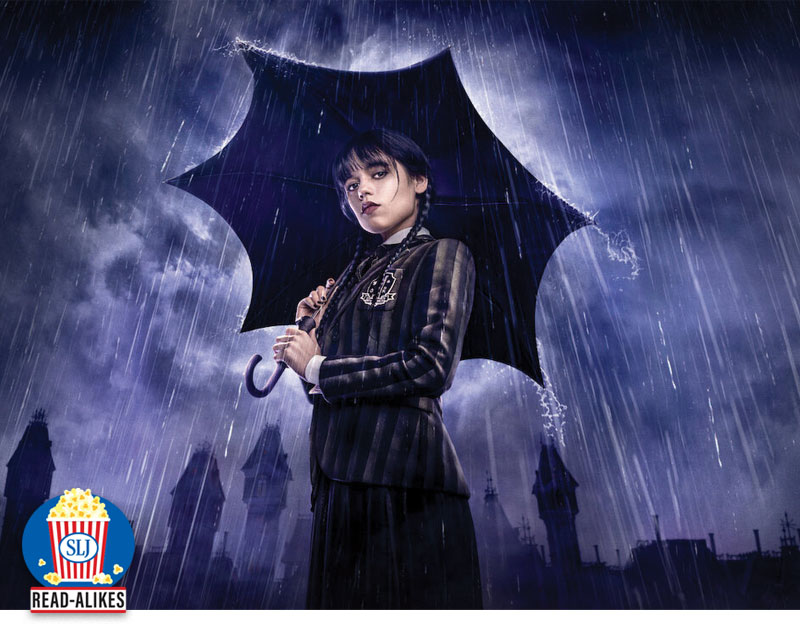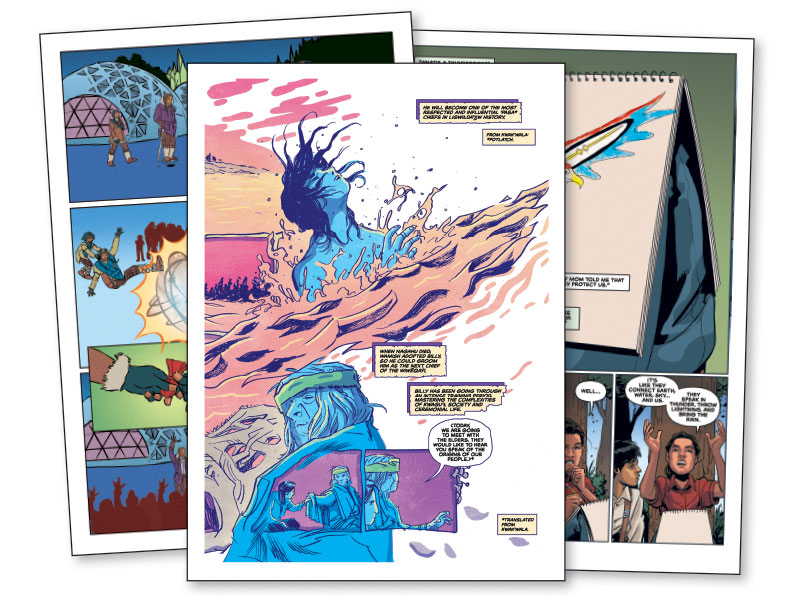Travels in Space and Time (Without Leaving the Sofa): Reflections on a Life Lived in the Company of Doctor Who, a guest post by author Mike A. Lancaster
 |
| Illustration by Meryl Lancaster |
In my earliest memories he’s there: The Doctor.
That renegade Timelord who spends his days battling evil across the universe armed only with a sonic screwdriver.
The lunatic in the blue box.
The alien being who saves earth again and again.
My first memory of The Doctor is from 1969, so I’d be about three years old at the time. Memories are not date-stamped though, and I lived a huge part of my childhood not knowing the exact year. It was only much later that I got to see again the episode of the TV show that it belonged to.
Anyway, 1969.
In the box in the corner of the room a man was in peril, trying to get through a door, reacting in horror as some weird kind of foam bubbled up around him.
ADVERTISEMENT
ADVERTISEMENT
Would it envelop him before the door opened?
I didn’t find out, because the show ended, and I was left with a cliff-hanger and an unearthly theme tune to rub that fact in.
Now, admittedly, foam might not sound like a particularly scary threat, but the man the foam was threatening to swallow up sure made it seem very scary indeed; he look terrified.
The man was Patrick Troughon; the character he was portraying was The Doctor; and it was an episode from the Doctor Who serial “The Seeds of Death.”
And, yes – I found out later – he got through the door.
Of course he did.
My second memory of Doctor Who comes from 1970.
Again, it’s little more than an image, hazy and devoid of context until I read the novelization a few years later. There was a row of shops, and one of them was selling clothes. Shop window dummies – mannequins – suddenly started moving, jerking into life. They smashed their way out onto the street, and their hands were hinged and concealed guns, and suddenly they were attacking the passers-by, shooting at them, killing them.
If the foam had been scary, this scene needed a whole new adjective. This was flat out terrifying. This was peep-out-from-between-fingers stuff. This was happening somewhere that looked a lot like my hometown, the shop window dummies – Autons: living plastic, receptacles for the Nestene Consciousness – were mowing down shoppers on a street just like the one I had to walk down to get sweets.
Of course, it was Doctor Who again, “Spearhead from Space”, but I don’t remember The Doctor even being in the episode. I don’t remember anything but those dummies.
But I, like thousands of others, did see the glass break as they smashed their way out, even though it didn’t.
Do you know something?
I discovered a couple of important – I’d go so far as to say life-changing – things because of those two dimly remembered episodes of Doctor Who.
First up, the show scared me.
Hot on the heels of that: I really liked being scared.
Needless to say: I was hooked.
My dad loves sports, and that’s why I love Doctor Who.
Let me explain.
On Saturday afternoons in the 1970s, on BBC One, there was a grueling schedule of sports programming lumped together under the banner Grandstand.
Me, I hated sports, but Grandstand was always on, whether it was horse racing; teams of men chasing a leather ball around a field; golf; athletics; rowing or bowls.
How does this explain a love of Doctor Who?
Well, when Grandstand ended, and the final scores of the day had been read, Doctor Who began, and the TV stayed on because the News was on afterwards.
I got to see, and fall in love with, Doctor Who.
It was Jon Pertwee, the third Doctor, and his adventures were almost exclusively earthbound. Rather than the traditional get-in-Tardis-end-up-somewhere-with-monsters set-up before and after him, this Doctor had a broken Tardis and had to wait for the alien threats to come to Earth.
Which, luckily for us, came frequently.
Weekly, even.
With the Brigadier and his UNIT troops, an assistant called Jo Grant, and a yellow roadster called Bessie, The Doctor fought monsters and villains and giant maggots. He faced off against the evil Timelord called The Master time and time again. He fought the Sea Devils, the Daemons, the Axons and the Daleks. He even found time to confront some of earth’s very real problems – environmental, social and technological – and the issues the show addressed became issues that I grew to care about. He was a wise, but somehow impish, figure, who knew a spot of Venusian martial arts, and possessed that weird other-worldly charm that defines a great Doctor.
Then, after meeting up with the previously mentioned giant maggots, Jo Grant was gone, and she was replaced with a new assistant, Sarah Jane Smith.
Now I’d like Jo a lot, but Sarah Jane was something else entirely. She was more than just a person for The Doctor to info dump to, or to scream her lungs out when the horrible thing of the week started shuffling, wheeling, crawling or creeping towards her. She was feisty, clever, and wasn’t afraid to speak her mind. She was a thoroughly modern woman who was as strong-willed and opinionated as The Doctor himself.
The passing of the torch from Jo to Sarah should have prepared me for that thing that was – unknown to me – looming in the near future.
But it didn’t.
The Doctor had been fighting the giant spiders of Metebelis Three, and the energy feedback from the final battle had taken its toll upon him. He arrived back at UNIT HQ injured and dying.
And then . . .
. . . he died.
My beloved Doctor.
Dead.
I remember waiting for him to jump again. I also remember him steadfastly refusing to do so.
The episode ended with something happening to The Doctor’s body. He was laying there and then there was light and . . . and suddenly he was someone else. Someone else who looked nothing at all like The Doctor.
I waited months for the next episode – Wikipedia tells me that it was between June and December of 1974 – and when it returned, Tom Baker was now The Doctor. It took me a whole four parts of his serial “Robot” to warm to him, and even then there was an odd mixture of suspicion and regret that wasn’t totally dispelled until Genesis of the Daleks. Then the unthinkable happened. The idea of regeneration that gives the show its longevity – by allowing a new actor to play The Doctor, so the show can outlive the people who play its main character – worked.
I accepted this new Doctor as THE Doctor.
Lives change. So do priorities. Sometime in the Peter Davison era, life got in the way. I’d catch the show whenever I could, but it had somehow become less of a must-see event. If I heard the Daleks were coming back, or the Cybermen, or the Silurians, then I’d try to be there to see them. The Doctor changed his face again, then again, but somehow I no longer saw his continuing adventures as vital to my life.
Diminishing quality in scripts and effects probably didn’t help, but nor did the science fictions books I was reading that made the struggles of The Doctor seem a little too soft for my liking.
I have gone back and caught up with everything that I missed since, and find them oddly charming, occasionally brilliant, and am still surprised by the odd episode, but to be brutally honest I can see why the BBC finally dropped the show from its production schedules. I thought that Sylvester McCoy had at least been taking the role into new territory, but too many bad choices were being made from him to survive for long. It needed a whole new direction, a total overhaul, but instead it was allowed to die.
I missed the show when it was gone, of course I did.
When Doctor Who was gone, it seemed like a light had gone out on British TV. It wasn’t just the end of an era, it was the end of all possible eras. Television – at least our home-grown shows – seemed pale and dull.
I tracked down old episodes, read the New Adventures, got crazily excited by every rumor of a return and preposterously disappointed when the rumor turned out to be false.
The Paul McGann film, flawed though it was, offered the merest glimmer of hope – and a tantalizing glimpse of what a tremendous Doctor McGann would have made – but when it was gone it looked like Doctor Who has breathed its last.
And then the impossible happened.
It came back.
Under the sublime leadership of Russell T. Davies it thrived. Stephen Moffat has taken Who even further forward. Suddenly the show that died of apathy is culturally important. People who profess to have no interest in sf still tune in. Even my mum, who was never a great Who fan, eagerly embraced this latest phase of the timelord’s adventures.
Now I get to watch Doctor Who with my own kids – not as an after-the-sports afterthought but as a family event – and the announcement of Peter Capaldi’s casting as the new Doctor got a cheer in our house louder than any we’ve ever given for a sporting event.
The Doctor, by regenerating, is able to transcend death, and so is the show.
It speaks across age boundaries and social boundaries, it sweeps across this crazy planet of ours, showing us that our need for heroes is universal, that human beings – with all their flaws and greed and stupidity – are wroth saving.
Even by a madman in a blue box.
Who’s not even human himself.
And with the 50th anniversary fast approaching, it seems a good time to celebrate the unique power of a TV show to capture our imaginations and make permanent impressions on our minds, so here, in no particular order, are my top 10 favorite Doctor Who stories:
The age-old question “if you could go back in time, would you kill Adolf Hitler?” is given a delicious spin in this Tom Baker six-parter. Of course, it’s not Hitler the serial deals with, it’s the Daleks, but the moral choice is well-handled – and superbly acted – and the fascist society that births the Daleks is chilling. The addition of Davros to the Dalek myth is a very welcome one. Simply great TV.
Seeing Neil Gaiman’s name on the credits of a Doctor Who episode was exciting enough, but the uber-talented scribe pulled off a master-stroke by making a character of the TARDIS, and delivered a heart-breaking tale that redefined the relationship of the timelord to his blue box.
Mike Lancaster lives in Cambridge with his wife, kids, dogs, cats, horses, the Leopard Geckos, and somewhere in between the zoo-keeping he writes stories. He is the author of Human.4 and The Future We Left Behind, both of which Karen thinks are gloriously good sci fi and great reads for Doctor Who fans. Both titles are published by EgmontUSA.
Human.4 Kyle Straker volunteered to be hypnotized at the annual community talent show, expecting the same old lame amateur acts. But when he wakes up, his world will never be the same. Televisions and computers no longer work, but a strange language streams across their screens. Everyone’s behaving oddly. It’s as if Kyle doesn’t exit.
Kyle Straker volunteered to be hypnotized at the annual community talent show, expecting the same old lame amateur acts. But when he wakes up, his world will never be the same. Televisions and computers no longer work, but a strange language streams across their screens. Everyone’s behaving oddly. It’s as if Kyle doesn’t exit.
Is this nightmare a result of the hypnosis? Will Kyle wake up with a snap of fingers to roars of laughter? Or is this something much more sinister?
Narrated on a set of found cassette tapes at an unspecified point in the future, Human.4 is an absolutely chilling look at technology gone too far.
ADVERTISEMENT
ADVERTISEMENT
The Future We Left Behind Thousands of years in the future the divide between humanity and technology has become nearly unrecognizable. Each thought, each action is logged, coded, backed up. Data is as easily exchanged through the fiber-optic-like cables that extend from fingertips as it might be through ordinary conversation. It’s a brave new world: A world that the Straker Tapes say is a result of many human “upgrades.” But no one is sure whether the Straker Tapes are a work of fiction or an eerie peek into an unimaginable past.
Thousands of years in the future the divide between humanity and technology has become nearly unrecognizable. Each thought, each action is logged, coded, backed up. Data is as easily exchanged through the fiber-optic-like cables that extend from fingertips as it might be through ordinary conversation. It’s a brave new world: A world that the Straker Tapes say is a result of many human “upgrades.” But no one is sure whether the Straker Tapes are a work of fiction or an eerie peek into an unimaginable past.
Nearly sixteen-year-old Peter Vincent has been raised to believe that everything that the backward Strakerites cling to is insane–an utter waste of time and potential. Since his father is David Vincent, genius inventor of the artificial bees that saved the world’s
crops and prevented massive famine, how could Peter believe anything else?
But when Peter meets Alpha, a Strakerite his own age, suddenly the theories about society-upgrades don’t sound quite so crazy, especially when she shows him evidence that another upgrade is imminent. And worse, there may be a conspiracy by the leaders of the establishment to cover it up. A conspiracy spearheaded by Peter’s own father.
Gripping and full of unexpected twists, The Future We Left Behind takes the unsettling questions raised in Human.4, and flips them entirely. What if we knew that the very way we live was about to be changed in an instant, and we could stop it? And what if everything we are sure we know is entirely wrong?
Filed under: Doctor Who, Human.4, Mike Lancaster, The Future We Left Behind
About Karen Jensen, MLS
Karen Jensen has been a Teen Services Librarian for almost 30 years. She created TLT in 2011 and is the co-editor of The Whole Library Handbook: Teen Services with Heather Booth (ALA Editions, 2014).
ADVERTISEMENT
ADVERTISEMENT
SLJ Blog Network
The Moral Dilemma of THE MONSTER AT THE END OF THIS BOOK
Cover Reveal and Q&A: The One and Only Googoosh with Azadeh Westergaard
Winnie-The-Pooh | Review
Parsing Religion in Public Schools
ADVERTISEMENT














